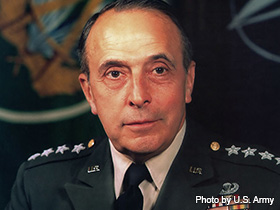Army; Army Distinguished Service Medal; Army War College; Cold War; Deputy Commandant of the National War College; General; Honesdale; Joint Chief of Staff; Joint Strategic Survey Committee; Korean Service Medal; Korean War; Mediterranean campaign; NATO; Rockefeller Commission; West Point; World War II
Lyman Louis Lemnitzer was born in Honesdale, Pennsylvania on August 29, 1899. Lemnitzer began his military career at West Point Military Academy and eventually the Army War College. His career in the armed services covered the time period from World War II all the way up through and including the Cold War. Lemnitzer was appointed Chairman of the Joint Chief of Staff in 1960 by President Eisenhower, which was considered by most to be his most noteworthy achievement. Lemnitzer died on November 12, 1988 in Washington D.C.
General Lyman Lemnitzer was born on August 29, 1899 in Honesdale, Pennsylvania. After receiving his high school diploma, General Lemnitzer attended West Point Military Academy where he graduated in 1920 and was commissioned as a second lieutenant. His active military duty commenced in the Philippines where he served with his battery and began to advance through the military ranks.
After leaving the Philippines, Lemnitzer met and married his wife, Katherine Mead Tryon in 1923. General Lemnitzer returned to West Point in 1926 to teach physics, mechanics, and hydraulics. He then returned to his own schooling at the Army War College where he graduated in 1940 and was shortly later promoted to major. This education helped to prepare Lemnitzer as a planner during the time period before World War II.
During World War II, General Lemnitzer played an important role in the strategy used by the allied forces, especially in the invasions of Northern Africa and Sicily. After these crucial victories, Lemnitzer was promoted to one of the top leaders of the allied forces Mediterranean campaign where he served until the end of the war.
After World War II concluded, Lemnitzer was assigned to the Joint Strategic Survey Committee of the Joint Chiefs of Staff and was later named Deputy Commandant of the National War College. During the Korean War, he was placed in command of the 7th Infantry Division in 1951 and was promoted to the rank of Lieutenant General and received the Korean Service Medal at the age of 51. Lemnitzer felt that many of the United States' future conflicts would be through coalitions so he pushed for a more unified system with European nations, straying away from the typical isolation system Americans were accustomed to.
Shortly before the end of Dwight Eisenhower's presidency, the president appointed Lemnitzer to the position of Chairman of the Joint Chiefs of Staff where he began to oversee the production of the American nuclear program. In 1963, Lemnitzer was chosen by President Kennedy to become the supreme commander of NATO. During his time as supreme commander, Lemnitzer navigated NATO through several intense political situations including the Cold War and the Greek and Turkish conflict over possession of Cyprus. General Lemnitzer served as NATO supreme commander until 1969, when he retired from military duty after an illustrious career. During his career of nearly fifty years, Lemnitzer obtained many prestigious military awards including the Army Distinguished Service Medal, the Navy Distinguished Service Medal, the Air Force Distinguished Service Medal, and the Silver Star, as well as several other awards both foreign and domestic.
Lemnitzer was always regarded by his peers as a genuine person and a great leader demanding the best out of all those who worked beside him. This trait was well exhibited by Lemnitzer in one of his final speeches at the Army War College, which is documented in L. James Binder's Lemnitzer: A Soldier for his Time where he stated;
It is a serious error for any officer to attempt to emulate one or more qualities of our great military leaders when such qualities are lacking in his own individual makeup. Any attempts in this regard are usually so transparent that anyone...can easily see through them. My advice is to turn in the very best performance you are capable of, but, above all, be yourself.
After his retirement, Lemnitzer was appointed to the Rockefeller Commission, which examined a possible conspiracy with the CIA's involvement with the Kennedy assassination. General Lyman Lemnitzer died on November 12, 1988 in Washington D.C. He was buried in Arlington National Cemetery along side his wife, Katherine.
- Binder, L. James. Lemnitzer: A Soldier of His Time. New York: Brassey's, 1997.
- "Lyman Louis Lemnitzer." U.S. Army Center of Military History. Feb 2006. Army Archives. 6 Feb 2008. <>http://www.history.army.mil/books/CG&CSA/Lemnitzer-LL.htm>.
- MacMillan, Margaret. Canada and NATO: Uneasy Past, Uncertain Future. London: Waterloo Press, 1990.
Gen. Lyman Lemnitzer commanded NATO in the late 1960s.

